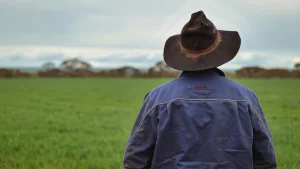
Despite strength in farm balance sheets and the overall health of the sector following more than two years of high rainfall and exceptional commodity prices, more farmers now believe conditions are set to worsen over the year ahead rather than improve.
For the first time since December 2019 the rural confidence nationally has moved into ‘negative’ territory, with more farmers taking a pessimistic rather than optimistic view of the year ahead.
The survey found 85 per cent of all farmers questioned nationally were extremely concerned about the threat of FMD and its potential impact on the Australian agricultural industry.
Rabobank Australia CEO Peter Knoblanche said while the nation’s farm sector was in a very healthy state financially, there were several challenging or concerning factors now clouding what was previously a largely overall positive outlook.

“Long term, I think farmers are still very confident about agriculture,” Mr Knoblanche said.
“There is good domestic and worldwide demand for our rural commodities, productivity and profitability is high and farmers have done very well rebuilding after the drought and building greater resilience into their businesses.
“However, margins are starting to come under pressure from the ongoing rise in input costs, and farmers are carefully monitoring and managing those costs.
“And there is definitely some anxiety among livestock producers about the heightened threat of an FMD incursion, and the potential impact this would cause should it enter Australia.”
Local dairy farmer and eastAUSmilk board member Kay Tommerup said increased milk prices were a boost to farmers.
“Whilst dairy farmers have certainly welcomed the well-earned, and long awaited, increase to farm gate prices over the past year, it continues to be a balancing act as higher input costs threaten to eat into those gains quite substantially,” she said.
“Higher grain costs and the huge jump in fertiliser prices, combined with the skyrocketing cost of fuel, will continue to challenge the industry.
“And with another wet summer forecast for the coming season, we would certainly be hoping for grass-growing weather rather than flooding rain.
“If we can have a win with the weather and milk pricing stays high, it will certainly assist dairy farmers to counter the effects of rising input costs.”
Mr Knoblanche said optimism was strongest among cotton, dairy, sugar and grain producers, while mixed livestock producers were the most pessimistic group of those surveyed.
However almost half of surveyed Australian farmers said they believe conditions will remain the same as they currently are over the year ahead, which up till now have been overall very good.
Harrisville dairy farmer Ross McInnes says if the BOM prediction of more floods proved correct, it would have a devastating effect.
“This year since February has been the toughest period I’ve certainly been through,” he said.
“I don’t think it makes any difference which type of agriculture you’re in, it’s just been too wet.”
Mr McInnes said he milked about 450 cows and lost about 40 due to excessive rainfall.
“When you have that much rain and it just keeps going you have hoof issues, mastitis and other health issues,” he said.
“We’re staying aware of the FMD threat but probably more likely to get here is lumpy skin disease because it’s spread by insects. It wouldn’t take too much to get out of Indonesia.
“I think every farm is taking steps with biosecurity, so if someone doesn’t need to be on the farm you just make those decisions.
“The biggest trouble with an incursion, say with foot and mouth disease, is the fact that you have a situation where you’re still going to have the milk tanker come in every day or two.
“So you’ve got vehicles travelling from farm to farm and that becomes a biosecurity issue.”
Mr McInnes said he was hoping for average rainfall this summer.
“It’s going to cause a lot of grief if we have another really wet summer,” he said.
“If we get one big storm there’s going to be floods in all the small creeks around the place … it’s going to be another challenging year.
“I think everyone’s hoping they can get their crops in and put some feed away because speaking with other dairy farmers, especially in northern NSW, all their conserve feed supplies have been used up, so they’re very vulnerable at the moment.
“With another wet summer we just won’t have those feed reserves we would normally have on tap.”
Towri Sheep Cheese farmer Dallas Davison said more heavy rainfall would be a worry.
“If we do have another wet season I don’t know how the sheep will cope because they’re still recovering from foot rot and worms from the last lot of rain,” she said.
“Not to mention our property … the grass has gone sour and you’ve still got really wet ground, it’s horrible.
“We’re trying to build up more areas so we can put the sheep up higher because we know it’s coming and we’re just trying to prepare for it.”
Ms Davidson said the farm lost animals after the floods.
“We lost a lot of the old girls, which is really hard because the old girls teach the young oneshow to go up on the milking frame,” she said.
“We have to push them up and teach them how to do it … it’s really stressful because we have a season full of new ewes that have never been milked before.”
Ms Davidson said rising fuel costs had been hard on agritourism.
“People are less likely to make the drive to the Scenic Rim, to do those big day trips to come and see us … it’s just been a massive ripple effect.”





















